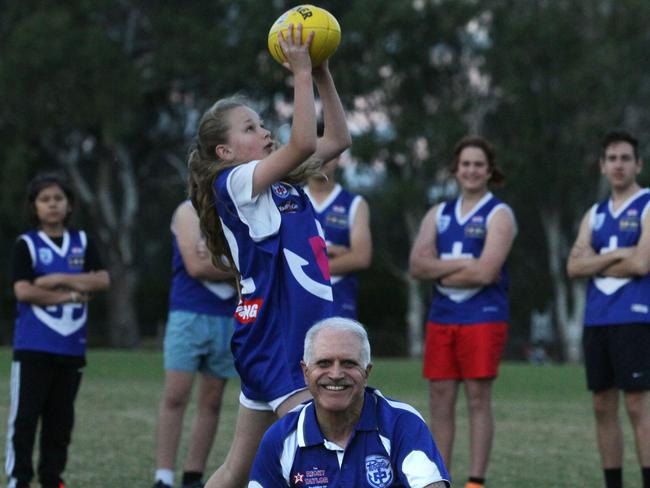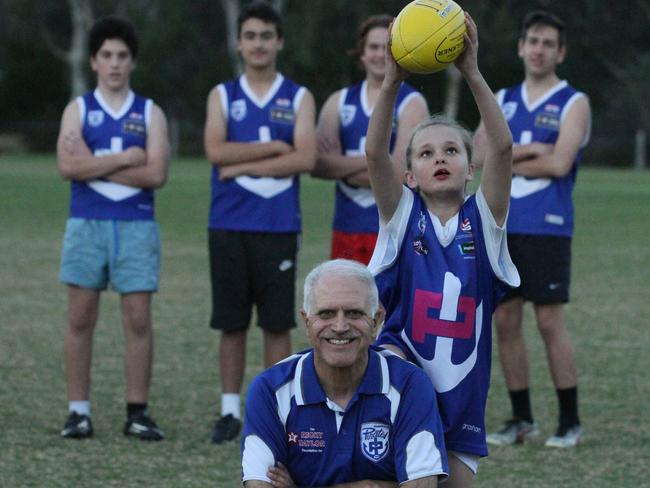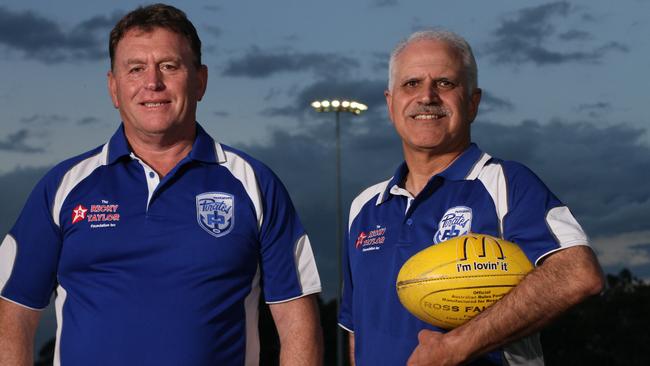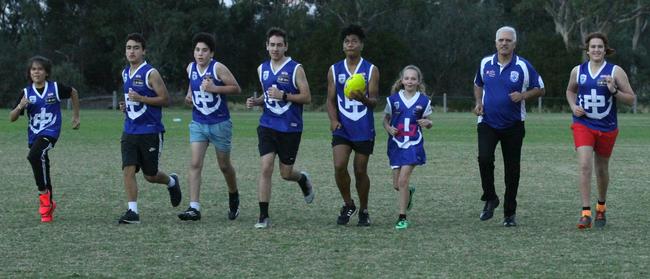AFL Victoria’s plan to boost junior football in Greater Dandenong
In 1995 there were 15 junior football clubs in Greater Dandenong. With just three now remaining, officials are proposing dramatic changes to reel kids from diverse backgrounds back into Aussie rules.

Local Footy
Don't miss out on the headlines from Local Footy. Followed categories will be added to My News.
Australian rules football could be played at temples, mosques and carparks under a plan to rejuvenate the game in Greater Dandenong.
AFL Victoria’s Gary Brown says officials need to “think outside the square’’ to connect with the area’s multicultural community.
Brown, a football development manager for the southern Melbourne region, has for 12 months studied the decline of football in the City of Greater Dandenong.
MORE LOCAL FOOTY
EFL: LIONS LOOKING GOOD IN DIVISION 1
MAGPIES SURVIVE SHARKS’ LATE LUNGE AT VICTORY
FIERCE COMPETITION FOR SPOTS AT ABERFELDIE
He is adamant the game “has a pulse’’ but needs to be innovative to capture the interest of the burgeoning migrant population.
With North Dandenong Junior Football Club sliding into recess last month, only three clubs with under-age teams remain in Greater Dandenong: Noble Park, Parkmore and Keysborough.
In 1995 there were 15 junior clubs.
Schools are the focus of strategies to interest youngsters in football, with programs running for up to six weeks in every primary school and some hosting after-school Auskick centres.
“We must approach football engagement so differently in these extreme culturally diverse areas,’’ Brown said.

“Football engagement as we once knew it just doesn’t resonate in these areas. Taking our game to the many culturally diverse areas rather than just expecting them to come to us is the focus going forward.
“There is absolutely no doubt that football has a pulse in the City of Greater Dandenong and after-school programs and modified junior competitions held during the week are the key to it.’’
St Kilda and Melbourne football clubs are involved as part of the AFL’s Next Generation Academy.
Brown said “cultural community’’ Auskick groups could also be established, similar to the Gurdwara Indian centre in Craigieburn. It started in the car park at a Sikh temple and has grown into the Hume Bombers Junior Football Club.
Brown said it made sense to start Auskick at places of worship on weekends.
“That’s part of taking football to diverse communities,’’ he said.

Five schools operated free after-school Auskick programs in term one this year, with the hope youngsters will move on to club-run Auskick centres.
The summer-autumn program involved 260 participants — 22 at Wooranna Park, 84 at St Joseph’s in Springvale, 21 at Dandenong South, 23 at St Elizabeth’s and 108 at Dandenong North. Brown said he was “blown away’’ by the numbers.
“As a comparison, last year there was a total of 118 registered Auskick participants at the six ‘mainstream’ centres across the City of Greater Dandenong,’’ he said.
“There must have been over 200 parents and siblings in attendance at the final session of our summer/autumn program at North Dandenong Primary School, incredible stuff. The younger siblings also joined in and had a ball.’’
He said the after-school model allowed many parents to “view our game for the first time in a fun, safe and full-on active environment’’.
“They loved it. Normal school clinics are OK and have a place, no doubt, but the parents aren’t there during school times and obviously have no connection,’’ Brown said.
There are plans to start an after-school multicultural junior competition in terms two and three.
Meanwhile, 25 boys and girls have registered for the North Dandenong Auskick program, which Brown said was “hopefully the building blocks for a new era at the North Dandy Junior Football Club’’.

He said there was a number of factors holding back youngsters from the city’s large migrant population from playing football. They included:
■ language barriers.
■ affordability.
■ lack of transport.
■ “unfamiliar cultural and social expectations’’.
■ religious beliefs.
■ unfamiliarity with structured sport.
■ unable to attend weekend sport due to language school, prayer days and study.
■ climate.
■ Family responsibilities.
■ racism and discrimination.
Brown said the summer-autumn after-school Auskick programs were timed for warm weather.
He said the cold of winter months was a “huge barrier’’ to outdoor sport among people from countries with hot and dry climates.
Numbers at Auskick invariably fall when the weather is cold and wet.
Greater Dandenong is the most culturally diverse local government area in Australia. At every school more than 70 per cent of students are from non-English speaking backgrounds, with most over 80 per cent and six primary schools more than 90 per cent.
AFL Victoria and the City of Greater Dandenong held club forums and education and information sessions last year to discuss reviving football in the area.

Brown said the clubs were “fully aware of the challenges and the strategic direction going forward’’.
“The valued volunteers are working very hard and thinking differently in their approach in regards to community engagement,’’ he said.
FOOTY IN SCHOOLS, THE STRATEGY
TERM 1
First “warmer climate’’ after-school Auskick centres, linking clubs and Auskick centres.
Gary Brown: “Fantastic response and success.’’
First “warmer climate’’ multicultural school programs, connecting clubs and Auskick centres.
First ‘warmer climate’ gala day, on Friday, March 29 at Greaves Reserve.
TERM 2
Multicultural school programs
First after-school “round robin’’ modified rules schools competition (four to six weeks) with the schools that ran after-school Auskick program in term one.
School gala days.
TERM 3
After-school “round robin” modified rules school competition wearing junior club colours, linking to clubs.
School gala days.


